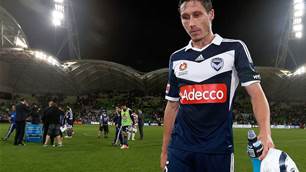With more experience at 21 than most players have in a career, Socceroo Mark Milligan has a maturity beyond his years. And the World Cup was just the start...
Sometimes it’s hard to believe Mark Milligan is still so young.
A Hyundai A-League champion, World Cup Socceroo and one of the first names on the team sheet for Sydney FC, Milligan only turned 21 this August.
Sitting in a deep leather chair in his agent’s office in Kings Cross, his deep voice and thoughtful manner in which he answers my questions belie his tender years. Only the sparkling diamond stud in his ear can be seen as an indicator to his youth but even that could be written off as just a reverential nod to the dearly departed Dwight.
Milligan’s maturity is obviously something Socceroo coach Guus Hiddink saw when he selected the then 20 year-old to his Socceroo squad for the World Cup finals in Germany. It was a decision that not only shocked many pundits, but also Mark himself.
“I was in such a state of shock,” says Milligan, still looking a little incredulous at what happened. “I didn’t say much at all when I heard. I think my mum was much more excited. I was very quiet for a while, letting it all sink in.
“I was actually going to dinner with my mum. We were just driving out to a pub when Gary Moretti called me. I think I checked three times that it was Gary before I let him talk. I had an inkling before hand that it was coming but still the shock was unbelievable. You don’t expect that phone call at 7 o’clock on a Monday night.”
Although he didn’t get any time on the pitch during the Socceroos’ World Cup adventure, it’s an experience Milligan will never forget, having learnt things as a footballer he says will stay with him for the rest of his career.
And while ‘Millsy’ was happy to talk about his memories of the World Cup, Guus Hiddink’s influence and the collective belief that the team was going to do well, he really perked up when the subject of the next generation of Socceroos came up.
Like most men his age, there’s not much point dwelling on the past when there’s such a bright future to look forward to.
After being selected to the Socceroos, how was it hooking up with all these players you’d watched on TV for so long?
I came in for training a little bit early because I hadn’t really been playing that much, just state league with Sutherland, so I went down to Melbourne with Michael Beauchamp to do some work with Anthony Crea, the Socceroo fitness trainer. Stan Lazaridis and Josip Skoko were also there earlier, but the Sunday when everyone came in was really weird because I’d pretty much grown up watching all these guys play. Three World Cup qualifying campaigns of these guys trying to get through, and then I’m in the same team as them. It was very surreal.
I guess I felt a little out of place just standing around with them but the more you got to know them, the more you realise that they were just the same as me.
We heard you struck up a bit of a friendship with Stan. Did he take you and Michael under his wing?
Yeah, we had a lot of time together because there weren’t many of us there to start off with. We would go out to lunch and there was a lot of time to talk, not only about what was going to happen in the World Cup, but about his experiences as a player. As the camp went on, Michael and I had a few chats with Stan, right down to things about what to do with your money and what to look out for as a young professional – things that would help you out in life as well as football. And all the boys were like that.
I could have grabbed any one of them at any stage and had a chat to them about anything. They were all very helpful and very easy to get along with.
How did you take to the training sessions. It must have been a step up from Sutherland?
It took me a good two weeks to adapt to the pace. At training, if your touch wasn’t perfect then you’d get smashed. Everyone was so naturally competitive that you just had to make sure you were spot on each day. You had to be playing your best football at every training session just to keep up. It was very physical which also took a lot of getting used to, right up to the World Cup. Every day was so gruelling and you’d get back to your room after training and thank God for your bed! But every session I could feel a difference and see my game improving. We did a lot of the same drills over a period of time and each time I did the drills I could feel myself getting a little better. I found my touch improving or a run I made being a bit quicker. You could feel the difference physically and mentally.
What do you remember about your debut against Liechtenstein?
I think I warmed up for 85 minutes in that game! During the last 10 minutes I was very nervous, standing behind the bench warming up just sweating because we felt like if we were going to make our debut, then it was going to be then. I was pretty nervous that day and it was one that I will never forget. And I don’t remember a lot after I came on. I remember a lot of the game beforehand but honestly I remember coming on but nothing much else. That’s a weird one actually – I don’t know why?!
How was the feeling in the team before the Finals? Did you think you could leave your mark on the tournament?
We were together for eight weeks but right from the beginning when everyone got together you just had this feeling that we were going to be successful as a group. The confidence that everyone had in each other to do well and go to the next level, you could just feel it. And Hiddink is the sort of coach that no matter what he told you to do, you wouldn’t second guess him or think, “Nah, why am I doing that?” If you’re told to do something by him then you do it. He just gives off this air of authority that you know what he’s saying is right. You just do it and you don’t think about it. You had that much faith in this guy even though you didn’t know him. Some people you meet you just know what they’re saying is right and that’s the sign of a great leader.
What was your most memorable moment from your time in Germany?
There are so many great memories but I think the one that I think about a lot is Timmy’s second strike against Japan.
I remember that I was sitting next to Archie [Thompson] and we’ve all stood up as he’s hit it and then it hit the post. Suddenly it felt like it went to slow motion – we’ve all gone to sit down and then we realised that it had gone in and we were in the air again!
I remember that well as it felt like everything had slowed down for a few moments. And of course after the Croatia game when we made it through to the next stage was amazing. The thing I remember about that was when we first walked out we went to our right and that was towards the Croatian supporters, and they were all still hanging around and clapping. And then we made it round to our end and pretty much every single Australian supporter had hung around,
I guess hoping that we’d come back out. Archie’s little AC/DC thing was pretty good as well.
What will you take away with you from working with someone like Guus?
Playing-wise I learnt a lot of little things that people really wouldn’t understand if I tried to explain it. It only really has meaning to myself. Just positioning play… the way you see the game. I look at the game a lot differently now. One of my strengths has always been the way in which I can read the game and see what is going to happen. I learned so much from Hiddink about anticipation, reading other player’s body movements and how they shape up for things. And when I had the ball I worked on hiding passes and watching my body position so other players can’t read what I’m doing. Watching it on TV the normal person might not pick a lot of it up and I guess I hadn’t really picked it up either, but it’s all those little things that make you that much better. And really in my career I’ve done nothing so far, so anything like that is going to help me be a better player when I go out on the field. Every day I learnt something under Hiddink and that’s something that I’ll always remember. It’s a changing moment in your career.
Do you see your selection to the World Cup squad as a way of grooming you as a future leader of the Australian team? Giving you experience of what it’s like to be in the biggest football tournament in the world.
I can see that and I want to be playing for my country for a long time. I love wearing the green and gold and I think he was definitely taking along a few younger players to give us the experience that we can take into the future. The younger players need to know what it’s like to be at big tournaments and go into big games with confidence. And then when you do get a regular run in the team and play in big games then it’s not a shock to the system. I think he was trying to fill that footballing gap between a lot of us playing in the A-League and then stepping up to play in world class competition.
How important is continuity in the Australian game, having all the teams playing the same style of football?
All the good footballing nations do this. If you’re brought up in Holland, no matter what age you are, all the teams have the same style of play, they like getting it wide and attacking. Over here I don’t think we’ve had so much of that in the past with different coaches and philosophies; nothing that if you went a goal down, this was how you were supposed to play. You can’t always rely on individual brilliance, you need a structure. So when you’re all playing under the same structure or system, it’s easier for player like myself and Spase Dilevski and Stuey Musiliak to make that step up to from U20s or U23s to the national team if you know your job and the team’s job.
Do you see the style of football changing in the future?
I think we’re still going to play the same brand of football you saw from us in the World Cup. I know Ange [Postecoglou] at the U20s is concentrating on that with the players coming through there and with the U23s as well. We all love a passing game and all the players picked can pass the ball. I think we’re proving we can do that and we just don’t hit the ball long and hope someone will get on the end of it. And that’s at all levels. The U20s have had a good tour recently, there’s some good players coming through and we’re all on the same wavelength.
This two Australian team structure – one from the A-league and one from the European-based players – it’s even more important...
Yeah, if everyone’s playing the same sort of football at the same level, it makes it easier to bring the team together. We don’t get a lot of opportunities to play together as a national team but if all the national players, a group of forty or so who play in both Europe and Australia are all playing the same style of international football, they don’t have to go through that two or three days of getting to know each other’s thinking. It’s already there. I think that’s half the battle just knowing what the guy next to you is thinking without having to ask him. If I get the ball on the right, I know where my centre midfielder is going to going to be all the time.
With two teams, is it quite hard as a young player to know you’re not really going to get a big run in the team as the European players are always there?
It is hard but it is good that we have more options, that players who are playing in Australia are getting a chance to prove themselves at international level. In a year’s time when we’re heading into the Asian Cup we will be grateful there were so many players to choose from as it will have brought the general level of the players up. It goes back to having a lot of players who have experienced playing in the system before. It’s easier to put a player in who’s been there and experienced it before. It’s easier to teach someone something in a day than having them start from scratch.
A Hyundai A-League champion, World Cup Socceroo and one of the first names on the team sheet for Sydney FC, Milligan only turned 21 this August.
Sitting in a deep leather chair in his agent’s office in Kings Cross, his deep voice and thoughtful manner in which he answers my questions belie his tender years. Only the sparkling diamond stud in his ear can be seen as an indicator to his youth but even that could be written off as just a reverential nod to the dearly departed Dwight.
Milligan’s maturity is obviously something Socceroo coach Guus Hiddink saw when he selected the then 20 year-old to his Socceroo squad for the World Cup finals in Germany. It was a decision that not only shocked many pundits, but also Mark himself.
“I was in such a state of shock,” says Milligan, still looking a little incredulous at what happened. “I didn’t say much at all when I heard. I think my mum was much more excited. I was very quiet for a while, letting it all sink in.
“I was actually going to dinner with my mum. We were just driving out to a pub when Gary Moretti called me. I think I checked three times that it was Gary before I let him talk. I had an inkling before hand that it was coming but still the shock was unbelievable. You don’t expect that phone call at 7 o’clock on a Monday night.”
Although he didn’t get any time on the pitch during the Socceroos’ World Cup adventure, it’s an experience Milligan will never forget, having learnt things as a footballer he says will stay with him for the rest of his career.
And while ‘Millsy’ was happy to talk about his memories of the World Cup, Guus Hiddink’s influence and the collective belief that the team was going to do well, he really perked up when the subject of the next generation of Socceroos came up.
Like most men his age, there’s not much point dwelling on the past when there’s such a bright future to look forward to.
After being selected to the Socceroos, how was it hooking up with all these players you’d watched on TV for so long?
I came in for training a little bit early because I hadn’t really been playing that much, just state league with Sutherland, so I went down to Melbourne with Michael Beauchamp to do some work with Anthony Crea, the Socceroo fitness trainer. Stan Lazaridis and Josip Skoko were also there earlier, but the Sunday when everyone came in was really weird because I’d pretty much grown up watching all these guys play. Three World Cup qualifying campaigns of these guys trying to get through, and then I’m in the same team as them. It was very surreal.
I guess I felt a little out of place just standing around with them but the more you got to know them, the more you realise that they were just the same as me.
We heard you struck up a bit of a friendship with Stan. Did he take you and Michael under his wing?
Yeah, we had a lot of time together because there weren’t many of us there to start off with. We would go out to lunch and there was a lot of time to talk, not only about what was going to happen in the World Cup, but about his experiences as a player. As the camp went on, Michael and I had a few chats with Stan, right down to things about what to do with your money and what to look out for as a young professional – things that would help you out in life as well as football. And all the boys were like that.
I could have grabbed any one of them at any stage and had a chat to them about anything. They were all very helpful and very easy to get along with.
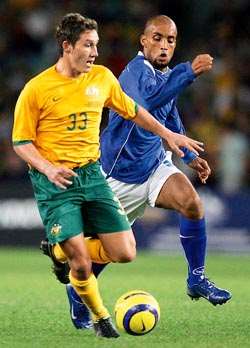 |
| Starting for the Socceroos for the first time against Kuwait |
It took me a good two weeks to adapt to the pace. At training, if your touch wasn’t perfect then you’d get smashed. Everyone was so naturally competitive that you just had to make sure you were spot on each day. You had to be playing your best football at every training session just to keep up. It was very physical which also took a lot of getting used to, right up to the World Cup. Every day was so gruelling and you’d get back to your room after training and thank God for your bed! But every session I could feel a difference and see my game improving. We did a lot of the same drills over a period of time and each time I did the drills I could feel myself getting a little better. I found my touch improving or a run I made being a bit quicker. You could feel the difference physically and mentally.
What do you remember about your debut against Liechtenstein?
I think I warmed up for 85 minutes in that game! During the last 10 minutes I was very nervous, standing behind the bench warming up just sweating because we felt like if we were going to make our debut, then it was going to be then. I was pretty nervous that day and it was one that I will never forget. And I don’t remember a lot after I came on. I remember a lot of the game beforehand but honestly I remember coming on but nothing much else. That’s a weird one actually – I don’t know why?!
How was the feeling in the team before the Finals? Did you think you could leave your mark on the tournament?
We were together for eight weeks but right from the beginning when everyone got together you just had this feeling that we were going to be successful as a group. The confidence that everyone had in each other to do well and go to the next level, you could just feel it. And Hiddink is the sort of coach that no matter what he told you to do, you wouldn’t second guess him or think, “Nah, why am I doing that?” If you’re told to do something by him then you do it. He just gives off this air of authority that you know what he’s saying is right. You just do it and you don’t think about it. You had that much faith in this guy even though you didn’t know him. Some people you meet you just know what they’re saying is right and that’s the sign of a great leader.
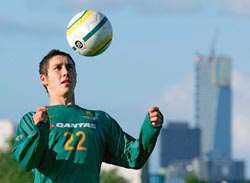 |
| Learning Jedi mind tricks from Master Guus |
What was your most memorable moment from your time in Germany?
There are so many great memories but I think the one that I think about a lot is Timmy’s second strike against Japan.
I remember that I was sitting next to Archie [Thompson] and we’ve all stood up as he’s hit it and then it hit the post. Suddenly it felt like it went to slow motion – we’ve all gone to sit down and then we realised that it had gone in and we were in the air again!
I remember that well as it felt like everything had slowed down for a few moments. And of course after the Croatia game when we made it through to the next stage was amazing. The thing I remember about that was when we first walked out we went to our right and that was towards the Croatian supporters, and they were all still hanging around and clapping. And then we made it round to our end and pretty much every single Australian supporter had hung around,
I guess hoping that we’d come back out. Archie’s little AC/DC thing was pretty good as well.
What will you take away with you from working with someone like Guus?
Playing-wise I learnt a lot of little things that people really wouldn’t understand if I tried to explain it. It only really has meaning to myself. Just positioning play… the way you see the game. I look at the game a lot differently now. One of my strengths has always been the way in which I can read the game and see what is going to happen. I learned so much from Hiddink about anticipation, reading other player’s body movements and how they shape up for things. And when I had the ball I worked on hiding passes and watching my body position so other players can’t read what I’m doing. Watching it on TV the normal person might not pick a lot of it up and I guess I hadn’t really picked it up either, but it’s all those little things that make you that much better. And really in my career I’ve done nothing so far, so anything like that is going to help me be a better player when I go out on the field. Every day I learnt something under Hiddink and that’s something that I’ll always remember. It’s a changing moment in your career.
Do you see your selection to the World Cup squad as a way of grooming you as a future leader of the Australian team? Giving you experience of what it’s like to be in the biggest football tournament in the world.
I can see that and I want to be playing for my country for a long time. I love wearing the green and gold and I think he was definitely taking along a few younger players to give us the experience that we can take into the future. The younger players need to know what it’s like to be at big tournaments and go into big games with confidence. And then when you do get a regular run in the team and play in big games then it’s not a shock to the system. I think he was trying to fill that footballing gap between a lot of us playing in the A-League and then stepping up to play in world class competition.
How important is continuity in the Australian game, having all the teams playing the same style of football?
All the good footballing nations do this. If you’re brought up in Holland, no matter what age you are, all the teams have the same style of play, they like getting it wide and attacking. Over here I don’t think we’ve had so much of that in the past with different coaches and philosophies; nothing that if you went a goal down, this was how you were supposed to play. You can’t always rely on individual brilliance, you need a structure. So when you’re all playing under the same structure or system, it’s easier for player like myself and Spase Dilevski and Stuey Musiliak to make that step up to from U20s or U23s to the national team if you know your job and the team’s job.
Do you see the style of football changing in the future?
I think we’re still going to play the same brand of football you saw from us in the World Cup. I know Ange [Postecoglou] at the U20s is concentrating on that with the players coming through there and with the U23s as well. We all love a passing game and all the players picked can pass the ball. I think we’re proving we can do that and we just don’t hit the ball long and hope someone will get on the end of it. And that’s at all levels. The U20s have had a good tour recently, there’s some good players coming through and we’re all on the same wavelength.
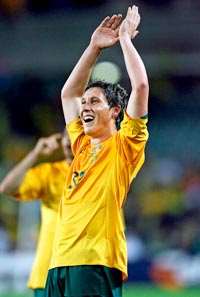 |
| Millsy sees himsel on the big screen in the green and gold |
This two Australian team structure – one from the A-league and one from the European-based players – it’s even more important...
Yeah, if everyone’s playing the same sort of football at the same level, it makes it easier to bring the team together. We don’t get a lot of opportunities to play together as a national team but if all the national players, a group of forty or so who play in both Europe and Australia are all playing the same style of international football, they don’t have to go through that two or three days of getting to know each other’s thinking. It’s already there. I think that’s half the battle just knowing what the guy next to you is thinking without having to ask him. If I get the ball on the right, I know where my centre midfielder is going to going to be all the time.
With two teams, is it quite hard as a young player to know you’re not really going to get a big run in the team as the European players are always there?
It is hard but it is good that we have more options, that players who are playing in Australia are getting a chance to prove themselves at international level. In a year’s time when we’re heading into the Asian Cup we will be grateful there were so many players to choose from as it will have brought the general level of the players up. It goes back to having a lot of players who have experienced playing in the system before. It’s easier to put a player in who’s been there and experienced it before. It’s easier to teach someone something in a day than having them start from scratch.
Related Articles
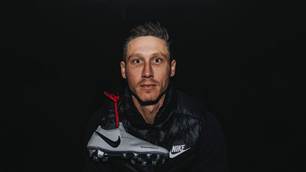
Milligan: We just fell short...
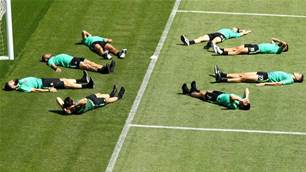
What would you be doing if you weren't at the World Cup, lads?
